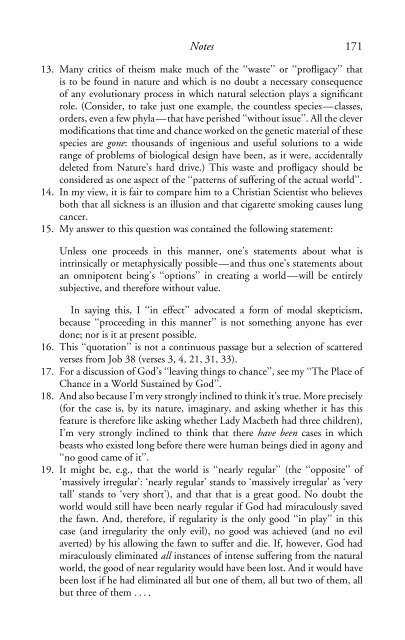The Problem of Evil - Common Sense Atheism
The Problem of Evil - Common Sense Atheism
The Problem of Evil - Common Sense Atheism
You also want an ePaper? Increase the reach of your titles
YUMPU automatically turns print PDFs into web optimized ePapers that Google loves.
Notes 171<br />
13. Many critics <strong>of</strong> theism make much <strong>of</strong> the ‘‘waste’’ or ‘‘pr<strong>of</strong>ligacy’’ that<br />
is to be found in nature and which is no doubt a necessary consequence<br />
<strong>of</strong> any evolutionary process in which natural selection plays a significant<br />
role. (Consider, to take just one example, the countless species—classes,<br />
orders, even a few phyla—that have perished ‘‘without issue’’. All the clever<br />
modifications that time and chance worked on the genetic material <strong>of</strong> these<br />
species are gone: thousands <strong>of</strong> ingenious and useful solutions to a wide<br />
range <strong>of</strong> problems <strong>of</strong> biological design have been, as it were, accidentally<br />
deleted from Nature’s hard drive.) This waste and pr<strong>of</strong>ligacy should be<br />
considered as one aspect <strong>of</strong> the ‘‘patterns <strong>of</strong> suffering <strong>of</strong> the actual world’’.<br />
14. In my view, it is fair to compare him to a Christian Scientist who believes<br />
both that all sickness is an illusion and that cigarette smoking causes lung<br />
cancer.<br />
15. My answer to this question was contained the following statement:<br />
Unless one proceeds in this manner, one’s statements about what is<br />
intrinsically or metaphysically possible—and thus one’s statements about<br />
an omnipotent being’s ‘‘options’’ in creating a world—will be entirely<br />
subjective, and therefore without value.<br />
In saying this, I ‘‘in effect’’ advocated a form <strong>of</strong> modal skepticism,<br />
because ‘‘proceeding in this manner’’ is not something anyone has ever<br />
done; nor is it at present possible.<br />
16. This ‘‘quotation’’ is not a continuous passage but a selection <strong>of</strong> scattered<br />
verses from Job 38 (verses 3, 4, 21, 31, 33).<br />
17. For a discussion <strong>of</strong> God’s ‘‘leaving things to chance’’, see my ‘‘<strong>The</strong> Place <strong>of</strong><br />
Chance in a World Sustained by God’’.<br />
18. And also because I’m very strongly inclined to think it’s true. More precisely<br />
(for the case is, by its nature, imaginary, and asking whether it has this<br />
feature is therefore like asking whether Lady Macbeth had three children),<br />
I’m very strongly inclined to think that there have been cases in which<br />
beasts who existed long before there were human beings died in agony and<br />
‘‘no good came <strong>of</strong> it’’.<br />
19. It might be, e.g., that the world is ‘‘nearly regular’’ (the ‘‘opposite’’ <strong>of</strong><br />
‘massively irregular’: ‘nearly regular’ stands to ‘massively irregular’ as ‘very<br />
tall’ stands to ‘very short’), and that that is a great good. No doubt the<br />
world would still have been nearly regular if God had miraculously saved<br />
the fawn. And, therefore, if regularity is the only good ‘‘in play’’ in this<br />
case (and irregularity the only evil), no good was achieved (and no evil<br />
averted) by his allowing the fawn to suffer and die. If, however, God had<br />
miraculously eliminated all instances <strong>of</strong> intense suffering from the natural<br />
world, the good <strong>of</strong> near regularity would have been lost. And it would have<br />
been lost if he had eliminated all but one <strong>of</strong> them, all but two <strong>of</strong> them, all<br />
but three <strong>of</strong> them ....
















